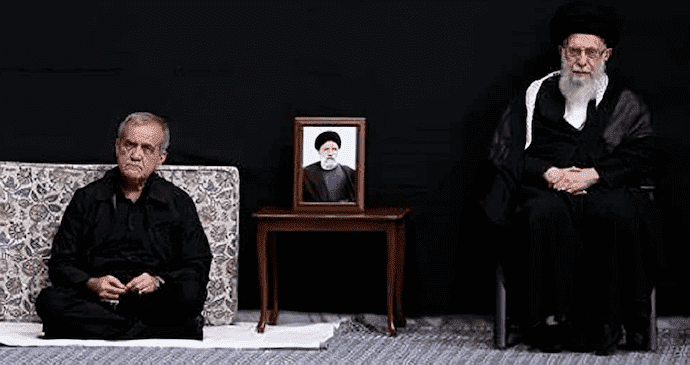|
إستماع
Getting your Trinity Audio player ready...
|
Masoud Pezeshkian couldn’t change Iranian foreign policy even if he wanted to.
By objective metrics, Iran’s government is among the most politically and socially intolerant, ruled by one of the world’s longest-serving dictators — the 85-year-old supreme leader, who purports to represent the prophet Muhammad on Earth. The regime maintains pretensions of being a representative democracy by offering its subjects closed but competitive elections, contests that often provide voters a genuine choice between two kinds of regime loyalists: those who cannot make their lives much better, and those who can potentially make their lives much worse. Pezeshkian’s election reflects Iranians’ unhappy choice.
Some Western policymakers might hope that Pezeshkian could usher in their long-anticipated rapprochement with Iran. After all, the new president intimated support for the 2015 Iran nuclear deal signed by President Barack Obama and abandoned by President Donald Trump. But Americans should not let hope triumph over experience. Iran is now a spoiler in many national security portfolios, including conflicts in Gaza, Ukraine, Syria and Yemen, as well as in global efforts to manage nuclear proliferation, energy security, cybersecurity and terrorism. Pezeshkian will likely have even less influence over these issues than previous Iranian presidents had, given his lack of a political base and popular mandate.
This diminished influence is a function of Iran’s internal turmoil. Given the crushed hopes of the 2022-2023 “Women, Life, Freedom” protests, coupled with continued economic decay, the snap elections to replace President Ebrahim Raisi — who died in a helicopter crash in May — elicited historically low turnout, resulting in a second-round runoff between two longtime regime loyalists.
During the campaign, Pezeshkian portrayed himself as a reformer sympathetic to popular discontent, but repeatedly also called himself a “principlist,” committed to the ideological principles of the revolution and devoted to Ayatollah Khamenei and his agenda for Iran (one of the main sources of the discontent). Though he has in the past publicly declared allegiance to the Islamic Revolutionary Guard Corps and criticized “terrorist” and “criminal” American policies, he campaigned with prominent diplomats, including former foreign minister Javad Zarif, with experience negotiating with the United States.
Pezeshkian’s runoff opponent was Saeed Jalili, a hard-line 58-year-old ideologue and intransigent former nuclear negotiator whose PhD dissertation was on the prophet Muhammad’s foreign policy. Given Pezeshkian’s uninspiring platform and history — videos resurfaced of him boasting of his youthful efforts to coerce women to wear mandatory hijab — his campaign did not seek to generate enthusiasm for their candidate as much as fear of Jalili and his supporters, whom they likened to the Taliban.
The 60 percent of Iranians who refrained from voting in the first round of elections were thus presented with a genuine dilemma. Pezeshkian would not have the power or even desire to significantly change the Islamic republic. Yet Jalili could hasten the country’s downward economic spiral and increase the likelihood of greater economic sanctions and potential conflict with the United States, especially in a second Trump administration.
“Should I cast a vote and legitimize the regime,” a merchant friend in Tehran asked me hypothetically, “or refrain from voting and accept the potential consequences of a Jalili presidency?” He chose not to vote, he told me, but did not begrudge those who did.
“No one is naive enough to think Pezeshkian or anyone else within that rotten system can make Iran what it should be,” Siamak Namazi, a U.S. citizen who was held hostage for eight years by the Islamic republic, told me. “But a Jalili presidency would have been scary.”
The history of Iranian presidencies offers little reason for optimism. Since Khamenei became supreme leader in 1989, five Iranian presidents (Ali Akbar Hashemi Rafsanjani, Mohammad Khatami, Mahmoud Ahmadinejad, Hassan Rouhani and Ebrahim Raisi) have come and gone, but none has brought meaningful or lasting change to Iran’s power structure — or its internal or external conduct.
Khamenei and the Revolutionary Guard — which he commands — have grown more powerful over the decades and dominate the country’s byzantine political institutions, as well as the judiciary, media and surveillance state. Social repression and endemic governmental corruption, mismanagement and incompetence have remained constant, regardless of who is president. Similarly, the Islamic republic’s longtime external policies — opposition to the United States and Israel, support for regional militias, nuclear and military ambitions, threats against overseas dissidents, and hostage-taking of foreign (including American) nationals — have also persisted.
One senior European diplomat in Tehran likened Pezeshkian’s election to a different train car on the same railroad tracks. “It’s not about what Pezeshkian says he wants to do,” he told me. “It is all about what he is allowed to do — and there is no evidence to suggest the Revolutionary Guard will change the many policies antithetical to our interests, and those of the Iranian people.”
Although Pezeshkian will not change the regime’s strategic and ideological aims, his appointed foreign policy advisers are likely to be cosmopolitan English speakers rather than unsophisticated ideologues. For the United States, more agile Iranian diplomats at the helm means the Islamic republic might be easier to engage — but also more difficult to isolate internationally.
The future of Iran, and its relationship with the United States, will be shaped most profoundly not by what happens after the arrival of a new Iranian president, but what happens after the death or departure of Khamenei.
Until then, Iranians will continue to chafe under a regime they cannot tolerate, reform or depose. And the United States will continue to face an Iranian regime that remains far more committed to fighting America than advancing the interests of its people.
*Karim Sadjadpour is a senior fellow at the Carnegie Endowment for International Peace.


